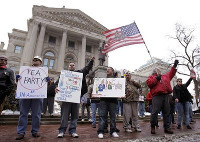Workers of the world, unite
By David Hoffman
 Although it has been overshadowed by events in Libya and Egypt, there is a battle going on in the United States, and it is not hyperbole to suggest that it is a battle for the very soul of the nation.
Although it has been overshadowed by events in Libya and Egypt, there is a battle going on in the United States, and it is not hyperbole to suggest that it is a battle for the very soul of the nation.
By current estimates, at least sixteen state governments are in the process of declaring war on American workers, and pro-labor protests have erupted in at least four of them-Wisconsin, Michigan, Ohio and Indiana. These protests inspired solidarity rallies across the United States, and even prompted Barack Obama to denounce the vilification of public workers.
Since these four states are located in the same geographical area, I initially thought that an analysis of their commonality would provide some clue to the motivations spurring their governments' anti-labor agendas. But after the governor of Indiana (and alleged presidential wannabe) Mitch Daniels called members of public employee unions "the privileged elite," and after an Indiana Deputy Attorney General opined that the governor of Wisconsin should use "deadly force" against pro-labor protesters, I realized that a closer examination of Indiana history and politics might be sufficient to reveal the origins of the anti-labor hysteria engulfing the nation.
In fairness, the Deputy Attorney General was fired for his remarks, and has since tried to claim they were made satirically. However, as noted by MSNBC, these remarks occurred just weeks after Congresswoman Gabrielle Giffords and several others were shot in Arizona-a tragedy that was supposed to have ushered in a period of "civility" in public discourse.
To begin my study of Indiana politics, I decided to research one of the state's most repressive urban backwaters: the City of South Bend.
The South Bend area appears to have all the elements to make it a progressive, enlightened community. It is located just a few miles from the Indiana/Michigan State Line (in an area known as "Michiana"), and is about ninety miles from Chicago, Illinois. It is ethnically diverse and home to several major colleges and universities.
But, as the saying goes, appearances can be deceiving. Although South Bend proclaims to be a "Twenty-first Century City," Newsweek recently declared it a dying one. And hastening its demise is a cabal of self-appointed censors, marching under the deceptive banner of "community values," who are trying to impose their narrow-minded sense of "morality" on South Bend's artistic and cultural communities, acting in concert with several reactionary members of South Bend's Common Council who unabashedly display stereotypical attitudes and intolerances more conducive to the nineteenth century than the twenty-first.
On two separate occasions this council has defeated a proposed ordinance designed to protect gays and lesbians from discrimination in the workplace. One of the council members who voted against this proposed ordinance also works as a South Bend police officer; another is a dentist who was caught on video allegedly mocking gays and lesbians; and a third works as assistant vice-chancellor for student affairs at a South Bend university, which, ironically, hosts a gay and lesbian student organization. As if to underscore how the promotion of intolerance is a political positive in South Bend, this council member, shortly after voting against this proposed ordinance for the first time, was invited to be the keynote speaker at a "human rights" luncheon. She has also received awards from several so-called "civil rights" groups and is a member of South Bend's "Hall of Fame."
Naturally some may ask what South Bend's local politics have to do with the Indiana governor's antipathy towards workers. The answer is simple: South Bend's hatreds are Indiana's hatreds. Even as the Obama administration announced that it will not defend the constitutionality of a federal law known as the "Defense of Marriage Act," Indiana legislators are endeavoring to add a similarly worded "Defense of Marriage Act" to the State Constitution.
And it will not be the first time that hatred was enshrined in that constitution.
Just across Indiana's northern border, in the neighboring state of Michigan, are several predominantly African-American communities that were founded more than a century ago by former slaves who escaped from captivity via the "Underground Railroad." They were forced to settle in Michigan because Article 13 of Indiana's Second Constitution (which was ratified in 1851) decreed "No Negro or Mulatto shall come into, or settle in, the State, after the adoption of this Constitution."
In keeping with this tradition, Indiana was also one of the few states, and the only northern state, whose political apparatus was once controlled by a faction of the Ku Klux Klan. During the 1920s, under the leadership of D.C. Stephenson, approximately a third of Indiana's white males belonged to the Klan. Stephenson considered himself to be above the law, largely due to his bribery of public officials. Although he often pontificated about protecting the virtues of "womanhood," he was convicted of second-degree murder in 1925 after causing the death of a schoolteacher he had kidnapped and raped. While his conviction diminished the influence of the Klan, its racism still reverberated in 1930 when two African-American men, Thomas Shipp and Abram Smith, were lynched by a mob in Marion, Indiana. And this political inanity, albeit in a less violent form, endured through the McCarthy era of the 1950s, when Indiana law required that professional wrestlers sign "loyalty oaths."
Undoubtedly some readers are now asking, "What does Indiana's present discrimination against gays and lesbians and past discrimination against racial minorities have to do with the current labor struggles?"
The answer is simple: throughout American history the labor movement has been undermined by capitalism's "divide and conquer" strategy. The plutocrats who control America's political and economic systems exploit workers as a class, regardless of race, gender, religion, age, national origin, sexual orientation or blue-collar vs. white-collar status.
To conceal this reality, they incessantly manipulate workers into hating, ridiculing, disdaining and/or discriminating against each other. In fact, three of the South Bend council members who refused to protect gays and lesbians from employment discrimination are African-American, a group whose own struggles against discrimination, as pointed out by the late Phil Ochs in his song Links on the Chain, did not always invoke much sympathy from many in the labor movement.
In addition, it is often difficult to persuade human beings to support people or policies when they have nothing to personally gain by doing so, or when their own rights, liberties and livelihoods are not at risk.
For example, thanks largely to the incompetence of the Bush dictatorship, America is currently mired in two of the longest wars in its history-in Afghanistan and Iraq. Yet the protests and outrage that engulfed America during the war in Vietnam have been largely absent. This cannot be because these wars are considered to be more "just," especially since it is now evident that the invasion of Iraq was based upon nothing but lies. What is different is that young people could be drafted and forced to fight in Vietnam, something they do not face with today's all-volunteer military.
Therefore it is essential for labor to understand that whenever the capitalists neuter one group or economic class others are certain to follow. Pastor Martin Niemoller spoke of this when he lamented his silence as the Nazis came for the Jews, Catholics, and trade unionists, because he discovered that nobody was left to protest when the Nazis came for him.
The irony of Mitch Daniels's anti-labor histrionics is that workers in Indiana have few legal rights or protections to begin with. Like numerous other states, Indiana law endorses "at-will" employment: absent an employment contract or collective bargaining agreement, an employee labors at the will of the employer and the employer receives this labor at the will of the employee. Either can terminate the employment relationship at any time and for any reason, or for no reason at all.
Although the legal theory supporting "at-will" employment infers equality between the employer and employee, in practice that is nothing but a myth. An employer who unjustly severs a relationship with an employee rarely suffers any economic repercussions for doing so. But employees who sever relationships with their employers, particularly without giving adequate notice, are frequently given poor references when they apply for other jobs. In addition, persons unemployed long enough to fall behind in their bills may find their search for a new job hampered by pre-employment credit checks, since many employers automatically presume that bad credit is indicative of "irresponsibility" or "dishonesty."
Of course, there are a few exceptions to the "at-will" doctrine. Federal laws prohibit discrimination based upon race, gender, religion, age, national origin and disability, although many employment attorneys will acknowledge that, in this conservative judicial milieu, very few cases are resolved in favor of the employee.
Indiana law does protect workers from being discharged if they file workers' compensation claims, or if they dispute the adequacy of the workers' compensation they are scheduled to receive. But Indiana courts have consistently refused to expand this protection to other labor laws. In a 2007 case, for example, an employee was fired after complaining that his employer had violated an Indiana statute by denying him overtime pay. Although the Indiana Supreme Court found that the employer did violate this statute, it nonetheless upheld the employee's firing under the "at-will" doctrine.
In other words, if workers in Indiana complain about violations of the very laws designed to protect them (with the exception of workers' compensation), they risk losing their jobs entirely. And if they file a lawsuit to protest this loss, they run the further risk of being surreptitiously blacklisted by prospective employers who view them as "troublemakers."
Even the so-called "protection" against retaliation for people who file workers' compensation claims is woefully inadequate. Anti-labor attorneys often advise employers to use this strategy to "get around" Indiana law: "Simply wait a couple of years so that any relationship between the workers' compensation claim and the worker's discharge appears tenuous. Then you can successfully pretend that his/her firing was unrelated to the worker's compensation claim."
In rationalizing these decisions, Indiana courts routinely proclaim that it is up to state lawmakers to expand protections for workers. But, given the remarks of Mitch Daniels and the fact that anti-labor "right-to-work" legislation has been introduced in the Indiana legislature, the chances of this happening are nil.
"Right-to-work" laws are primarily designed to weaken labor unions by denying them financial support, because workers who choose not to join unions do not have to pay union dues.
Of course the primary question is why such "right-to-work" legislation is even necessary in an employment environment that is likely to be anti-labor for decades, if not centuries to come. Already a common statement made by workers is, "At least I have a job." Naturally this means that the fear of losing that job will preclude all but the most courageous from asking for a raise, promotion, benefits, full-time employment or the opportunity to unionize.
One answer to this question may reside in the United States Supreme Court's egregious ruling in the 2010 case of Citizens United v. Federal Election Commission.
In that case, as I've discussed in previous Pravda.Ru articles, the court ruled that corporations have the same right to "freedom of speech" as individuals do. But, under the pretext of expanding this freedom, the court, in its myopic ignorance, actually weakened it, because corporations can now use their wealth and media access to influence political races and silence individual voices of dissent.
Supporters of the Citizens United decision were quick to proclaim that this alleged expansion of "freedom of speech" also applies to unions. But if "right-to-work" statutes weaken the finances of labor unions, then they will not be able to counter the resources and political influence of the corporations.
Another answer is that the elimination of labor unions will reduce wages and benefits for non-union workers who currently profit from a union's existence. Some of these non-union workers are actually paid higher wages, and enjoy better benefits, than their union counterparts. While anti-labor forces endeavor to attribute this to employer benevolence, the real motivation is to prevent workers from unionizing. But if there are no unions to join, there will be no need for non-union employers to match or surpass union scale wages and benefits.
In fairness, however, today's labor unrest should also examine whether many traditional labor unions are the panacea for American workers, or whether they exploit workers as well by collecting dues while doing little to earn them, and/or by failing to ensure that these dues are being properly managed and utilized.
Recently PBS aired a documentary about the tragic Triangle Shirtwaist Factory fire of 1911, where one hundred and forty-six workers, most of them women, lost their lives due to unsafe working conditions. Prior to this fire, the women had gone on strike to draw attention to their appalling working conditions. Many were beaten on the picket lines by thugs hired by the company's owners, while corrupt police officers looked the other way. And even though this strike was instrumental in unionizing many garment factories in the area, Triangle was not among them.
Yet, just a few years later, after having been born in so much tragedy and sacrifice, some garment workers' unions had been taken over by organized crime figures like Louis "Lepke" Buchalter. Over the years, evidence of organized crime's infiltration of labor unions have surfaced, from the still unsolved disappearance of former Teamster's Union President Jimmy Hoffa to the murder of Joseph Yablonski, a candidate for the presidency of the United Mine Workers. And just a few weeks ago, in what was described as "one of the largest mob round-ups in FBI history," over one hundred alleged Mafia members were arrested for crimes that included the exercise of control over labor unions and the corruption of union officials.
Still, in an alleged democracy, it would seem to be politically suicidal to attack the working class, whether they are union or non-union, particularly since anyone whose income and economic well-being are contingent upon the whims of others can be considered a member of this class. But the competition to lure businesses from state to state and even nation to nation has essentially stifled the incentive to protect the rights of workers. "Right-to-work" laws convey the message that a state is not "labor friendly," which, in turn, will eventually mean that all states will have to reduce workers' rights to their lowest common denominator.
Unfortunately, the only "revolution" America has been able to produce in recent times is the so-called tea-party "revolution." But this is not revolution at all, but regression. Even the tea party's own rhetoric indicates that its goal is not to take the country forward, but to "take the country back." And back means a time when racial, religious and ethnic minorities "knew their place"; when the rich became richer and the poor became poorer; when people died because they could not afford health insurance; when education, wealth and promotion were only gained through nepotism and cronyism; when justice meant "just us"; and when plutocracy masqueraded as democracy.
Already this regression is working. The current racists on the United States Supreme Court, joined by the self-loathing Clarence Thomas, have weakened or nullified many of the laws that civil rights activists struggled and died for, and they are doing their utmost to undermine the rights of labor as well.
Even as Congress considers the possibility of increasing the minimum age when the elderly can collect Social Security, the Supreme Court has made it easier for employers to discriminate against them: in Kimel v. Florida Board of Regents, the court ruled that the Age Discrimination in Employment Act (ADEA) does not apply to people employed by state governments, which includes public universities; and in Gross v. FBL Financial Services Inc., the court ruled that, in order to win an ADEA claim, complainants must prove that age discrimination was the sole reason they suffered "adverse employment actions"-an impossible burden to meet since employers have become extremely adept at fabricating "neutral, non-discriminatory" reasons for discharging employees.
What makes the rulings in Kimel and Gross contemptible and hypocritical is the fact that the so-called "justices" who eviscerated the ADEA are guaranteed lifetime employment. What makes these rulings ominous and irresponsible is the very real prospect that a plethora of America's citizens may soon be too young to collect Social Security, yet too old to be employable.
But America's youth also faces problems. A myriad of universities, colleges and trade schools are competing for tuition dollars, and this competition is annually releasing more and more educated people into an economy with fewer and fewer good paying jobs. Many of these graduates will be burdened with thousands of dollars in student loan debt that cannot be discharged through traditional bankruptcy methods, but can, if not repaid in a timely manner, negatively affect one's credit rating and prospects of finding a good paying job.
And even graduates lucky enough to find jobs might soon discover that earning higher gross incomes than workers without college degrees may not actually translate into higher disposable incomes once the monthly costs of student loan payments are deducted.
In other words, the financial benefits of attending college could be obliterated by the financial burdens of attending college.
Many graduates who cannot find employment frequently choose to enhance their prospects by attending law or graduate school. But, as a 2010 article in McClatchy Newspapers reported, oftentimes their only "reward" is more student loan debt and even fewer opportunities, because many employers automatically presume that applicants with Master's or Doctorate degrees will demand higher salaries than applicants with Bachelor's degrees.
And, in today's economy, even a Master's, Doctorate or law degree does not provide an automatic segue into a full-time teaching profession at a college or university.
The poor job market has forced, and will undoubtedly continue to force, many desperate college graduates to take part-time (adjunct) teaching jobs at colleges and universities. Although they are frequently led to believe that their adjunct status will eventually blossom into a full-time position, an unwritten rule of academia, and one I personally experienced, is "Once an adjunct, always an adjunct."
Even as universities and colleges are raising tuition costs for students, they are relying more and more on poorly paid adjunct instructors, who receive neither tenure nor benefits. Oftentimes the "rules" are even manipulated to compel an adjunct to work a full-time schedule for part-time pay. For example, the handbook of one university where I taught as an adjunct described a full-time instructor as one who taught four or more classes per semester. To get around this provision, the head of my division listed me as a "visiting lecturer."
So even within the "ivory towers" of academia contempt for labor reigns supreme.
If America continues on its present course, it may soon become a nation where many, if not most, of its college educated people are debt-ridden, underemployed, unemployed and/or homeless.
Although the slogan "Workers of the World, Unite" is disdained because of its association with Marxism, the reality is that workers of the world must unite before it's too late. Workers in industrialized nations must not only advocate for better working conditions and wages in their own countries, but for workers in poorer countries as well. By raising wages and labor standards throughout the world, the capitalists will have no nations to profitably "outsource" jobs to, no environments to intentionally or negligently pollute, no resources to selfishly plunder, and no underpaid, overworked laborers to exploit.
In truth, the real "elites" are the politicians who use their power to enrich cronies and greedy corporations by promoting "tax breaks," privatization, and other forms of corporate welfare. And, more often than not, these cronies and corporations "thank" their benefactors by failing or refusing to create new jobs and eliminating or outsourcing jobs already created. Yet, whenever the fiscal policies of the elites destroy the economy, the workers are always the ones who suffer, and the ones who are blamed.
America needs a true revolution, not one sponsored by "tea party" hypocrites who pretend they are wounded, overtaxed "everymen," while being secretly bankrolled by mega-corporations and billionaires.
America needs a workers' revolution, and a new political party to advocate for the rights of labor.
So refuse to play the "divide and conquer" game anymore. As I stated above, regardless of your race, gender, age, religion, national origin or sexual orientation, and regardless of whether you consider yourself white-collar or blue-collar, if your economic well-being and income is contingent upon the whims of others, you are a member of the working class.
And you are becoming less powerful, poorer, and more exploited everyday.
Workers of the world, unite.
David R. Hoffman
Legal Editor of Pravda.Ru
Subscribe to Pravda.Ru Telegram channel, Facebook, RSS!





